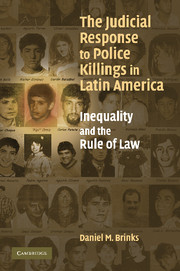Book contents
- Frontmatter
- Contents
- Preface
- 1 Effectiveness and Inequality in the Legal System
- 2 Charting Injustice in Argentina, Brazil, and Uruguay
- 3 Informational and Normative Shifts Across Jurisdictions
- 4 Buenos Aires – Political Interference and Informational Dependence
- 5 São Paulo – Normative Autonomy and Informational Failures
- 6 Uruguay – Strong Results from a Weak System
- 7 Córdoba – High Levels of Inequality in a Strong System
- 8 Salvador da Bahia – Social Cleansing Under Political and Judicial Indifference
- 9 Binding Leviathan
- Appendix: Methods, Case Selection, and Sampling
- References
- Index
5 - São Paulo – Normative Autonomy and Informational Failures
Published online by Cambridge University Press: 07 September 2009
- Frontmatter
- Contents
- Preface
- 1 Effectiveness and Inequality in the Legal System
- 2 Charting Injustice in Argentina, Brazil, and Uruguay
- 3 Informational and Normative Shifts Across Jurisdictions
- 4 Buenos Aires – Political Interference and Informational Dependence
- 5 São Paulo – Normative Autonomy and Informational Failures
- 6 Uruguay – Strong Results from a Weak System
- 7 Córdoba – High Levels of Inequality in a Strong System
- 8 Salvador da Bahia – Social Cleansing Under Political and Judicial Indifference
- 9 Binding Leviathan
- Appendix: Methods, Case Selection, and Sampling
- References
- Index
Summary
Então! Olhe pra você e lembre dos irmãos!
Com o sangue espalhado, fizeram muitas notícias!
Mortos da mão da polícia, fuzilados de bruços no chão.
Me causa raiva e indignação
A sua indiferença quanto à nossa destruicão!
Racionais MC's, “Júri Racional” (2006)Se eu fosse mágico?
Não existia droga, nem fome, nem polícia.
Racionais MC's, “Mágico de Oz” (1998)The Brazilian rap artists Racionais MC's sing of society's indifference to those shot by the police. Their words accurately suggest that state violence in Brazil occurs in a social context that is largely indifferent to the deaths of the poor and marginalized. Only the most dramatic and bloody of these events make the news. It is no surprise, then, that they put the police squarely in the trio of ills they would eliminate if they had magical powers: no more drugs, no more hunger, no more police. All three have a deadly effect on the urban poor of Brazil. This chapter relates precisely this story – the dismal failure of an otherwise relatively functional legal system to respond to a violent police force, largely owing to the indifference of the general public. São Paulo presents a clear challenge to the notion that democracy comes all of a piece. Political rights are alive and vibrant in São Paulo, and yet the police routinely violate fundamental civil rights and, in practical terms, remain above the law.
- Type
- Chapter
- Information
- The Judicial Response to Police Killings in Latin AmericaInequality and the Rule of Law, pp. 142 - 177Publisher: Cambridge University PressPrint publication year: 2007



